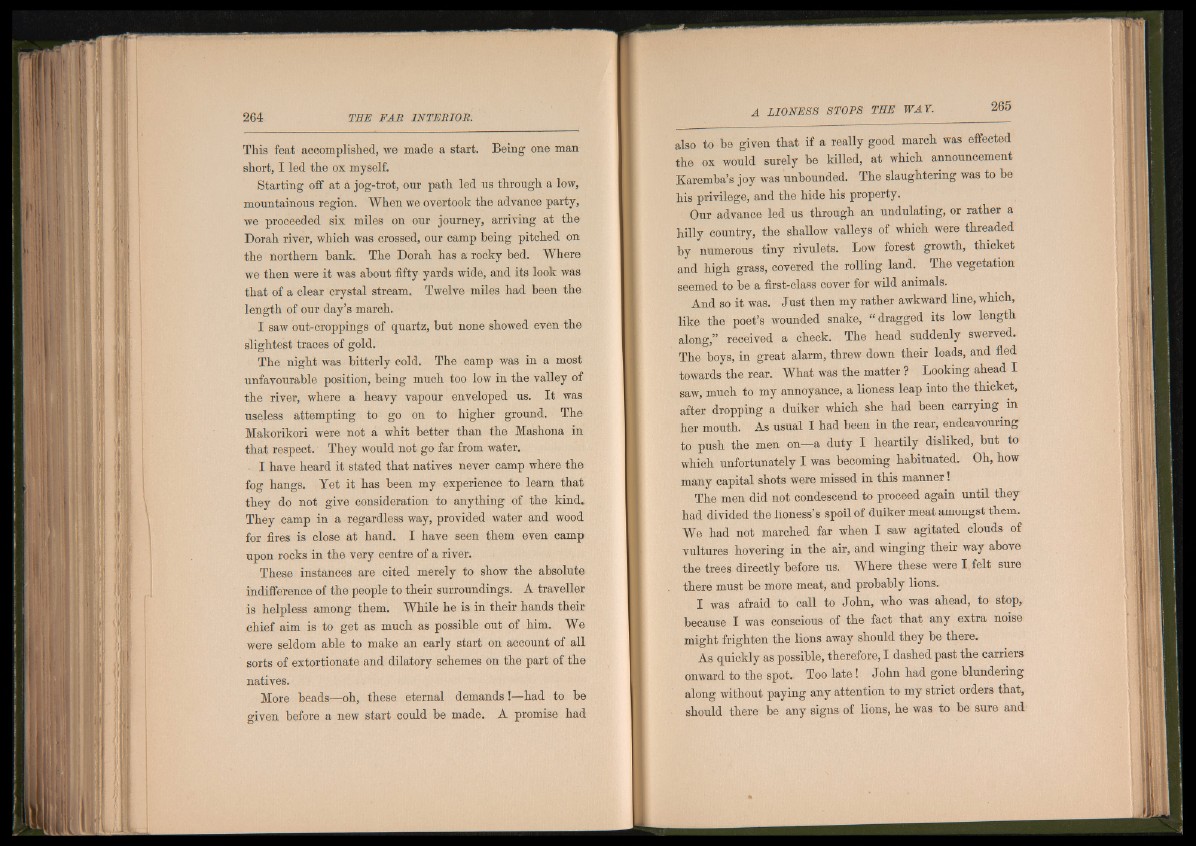
This feat accomplished, we made a start. Being one man
short, I led the ox myself.
Starting off at a jog-trot, our path led us through a low,
mountainous region. When we overtook the advance party,
we proceeded six miles on our journey, arriving at the
Dorah river, which was crossed, our camp being pitched on
the northern bank. The Dorah has a rocky bed. Where
we then were it was about fifty yards wide, and its look was
that of a clear crystal stream. Twelve miles had been the
length of our day’s march.
I saw out-croppings of quartz, but none showed even the
slightest traces of gold.
The night was bitterly cold. The camp was in a most
unfavourable position, being much too low in the valley of
the river, where a heavy vapour enveloped us. I t was
useless attempting to go on to higher ground. The
Makorikori were not a whit better than the Mashona in
that respect. They would not go far from water.
I have heard it stated that natives never camp where the
fog hangs. Yet it has been my experience to learn that
they do not give consideration to anything of the kind.
They camp in a regardless way, provided water and wood
for fires is close at hand. I have seen them even camp
upon rocks in the very centre of a river.
These instances are cited merely to show the absolute
indifference of the people to their surroundings. A traveller
is helpless among them. While he is in their hands their
chief aim is to get as much as possible out of him. We
were seldom able to make an early start on account of all
sorts of extortionate and dilatory schemes on the part of the
natives.
More beads—oh, these eternal demands !—had to be
given before a new start could be made. A promise had
also to be given that if a really good march was effected
the ox would surely be killed, at which announcement
Karemba’s joy was unbounded. The slaughtering was to be
his privilege, and the hide his property.
Our advance led us through an undulating, or rather a
hilly country, the shallow valleys of which were threaded
by numerous tiny rivulets. Low forest growth, thicket
and high grass, covered the rolling land. The vegetation
seemed to be a first-class cover for wild animals.
And so it was. Just then my rather awkward line, which,
like the poet’s wounded snake, “ dragged its low length
along,” received a check. The head suddenly swerved.
The boys, in great alarm, threw down their loads, and fled
towards the rear. What was the matter ? Looking ahead I
saw, much to my annoyance, a lioness leap into the thicket,
after dropping a duiker which she had been carrying in
her mouth. As usual I had been in the rear, endeavouring
to push the men on—a duty I heartily disliked, but to
which unfortunately I was becoming habituated. Oh, how
many capital shots were missed in this manner!
The men did not condescend to proceed again until they
had divided the lioness’s spoil of duiker meat amongst them.
We had not marched far when I saw agitated clouds of
vultures hovering in the air, and winging their way above
the trees directly before us. Wkere these were I felt sure
there must be more meat, and probably lions.
I was afraid to call to John, who was ahead, to stop,
because I was conscious of the fact that any extra noise
might frighten the lions away should they be there.
As quickly as possible, therefore, I dashed past the carriers
onward to the spot. Too la te ! John had gone blundering
along without paying any attention to my strict orders that,
should there be any signs of lions, he was to be sure and